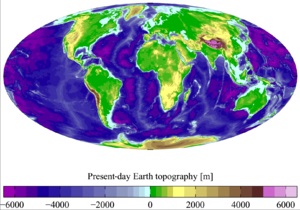|
|
| |
|
|
| |
|
|
|
|
| |
 |
| World ocean
bathymetry. |
Oceanography
Oceanography (compound of the Greek words ὠκεανός
meaning "ocean" and γράφω meaning "write"), also known
as oceanology, is the study of the physical and
biological aspects of the ocean. It is an important
Earth science, which covers a wide range of topics,
including ecosystem dynamics; ocean currents, waves, and
geophysical fluid dynamics; plate tectonics and the
geology of the sea floor; and fluxes of various chemical
substances and physical properties within the ocean and
across its boundaries. These diverse topics reflect
multiple disciplines that oceanographers blend to
further knowledge of the world ocean and understanding
of processes within: astronomy, biology, chemistry,
climatology, geography, geology, hydrology, meteorology
and physics. Paleoceanography studies the history of the
oceans in the geologic past. An oceanographer is a
person who studies many matters concerned with oceans
including marine geology, physics, chemistry and
biology. |
|
History
Humans first acquired knowledge of the waves and
currents of the seas and oceans in pre-historic times.
Observations on tides were recorded by Aristotle and
Strabo in 384-322 BC. Early exploration of the oceans
was primarily for cartography and mainly limited to its
surfaces and of the animals that fishermen brought up in
nets, though depth soundings by lead line were taken.
The Portuguese campaign of Atlantic navigation is the
earliest example of a systematic scientific large
project, sustained over many decades, studying the
currents and winds of the Atlantic. |
|
In recent years studies advanced particular knowledge on
ocean acidification, ocean heat content, ocean currents,
the El Niño phenomenon, mapping of methane hydrate
deposits, the carbon cycle, coastal erosion, weathering
and climate feedbacks in regards to climate change
interactions.
Study of the oceans is linked to understanding global
climate changes, potential global warming and related
biosphere concerns. The atmosphere and ocean are linked
because of evaporation and precipitation as well as
thermal flux (and solar insolation). Wind stress is a
major driver of ocean currents while the ocean is a sink
for atmospheric carbon dioxide. All these factors relate
to the ocean's biogeochemical setup.
Further understanding of the worlds oceans permit
scientists to better decide weather changes which in
addition guides to a more reliable utilization of earths
resources. |
|
Oceanographic institutions
The first international organization of oceanography was
created in 1902 as the International Council for the
Exploration of the Sea. In 1903 the Scripps Institution
of Oceanography was founded, followed by Woods Hole
Oceanographic Institution in 1930, Virginia Institute of
Marine Science in 1938, and later the Lamont-Doherty
Earth Observatory at Columbia University, and the School
of Oceanography at University of Washington. In Britain,
the National Oceanography Centre (an institute of the
Natural Environment Research Council) is the successor
to the UK's Institute of Oceanographic Sciences. In
Australia, CSIRO Marine and Atmospheric Research (CMAR),
is a leading centre. In 1921 the International
Hydrographic Bureau (IHB) was formed in Monaco. |
|
 Kiddle: Oceanography Kiddle: Oceanography
Wikipedia: Oceanography |
|
|
|
|
|
|
|
|
|
|
|
|
|
|
|
|
Search Fun Easy English |
|
|
|
|
|
|
|
|
|
|
|
|
|
|
|
About
Contact
Copyright
Resources
Site Map |